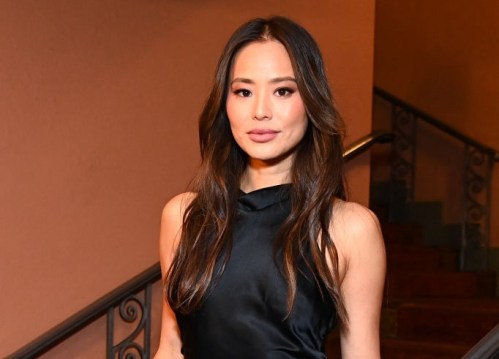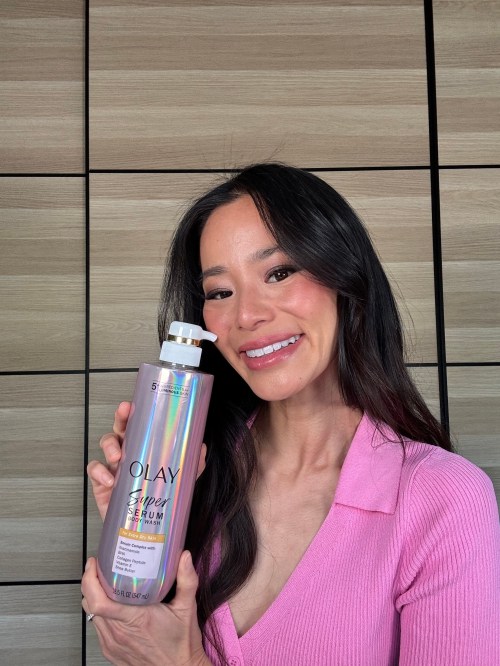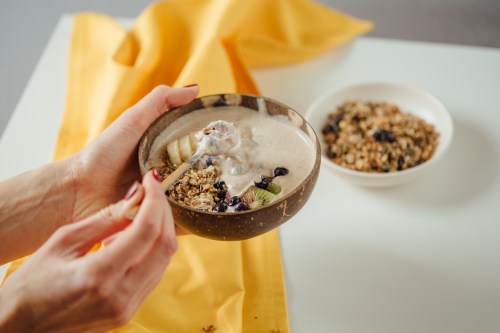Jamie Chung Is Unapologetically Breaking Generational Cycles as an Asian Woman and Mother
Plus, more on partnering with Olay, parenting, and practicing self-care.

For Jamie Chung, defying expectations and blazing her own trail is just a part of life. Born to immigrant parents, the Korean-American actor began her career in the early aughts on the MTV series, The Real World: San Diego, bringing more Asian American representation into the world of reality TV. Since then, you've probably seen Chung grace the screen in Princess Protection Program (shoutout to all the DCOM fans), Big Hero 6, Lovecraft Country, and her latest film—I'm Beginning to See the Light—which premiered on May 2.
But when she's not behind the camera, she's front and center in her family life, now as a mom to three-year-old twin sons. And just like the unique path she's forged for her career, Chung is also developing a brand new parenting playbook that slightly veers away from the generational patterns she witnessed while growing up.
We sat down with Chung to talk about it all—from motherhood to mental health, and so much more. And trust us, it's not a conversation you're going to want to miss.
Put your oxygen mask on first
Every time you board a plane, you hear the phrase, put your oxygen mask on first before assisting others. Sure, this is the instruction you get *in the off chance* that the flight you're on suddenly loses cabin pressure. But when it comes to self-care, the metaphor is just as relevant.
As a mom, actor, and—let's not forget—a person of her own, Chung has a lot to balance: young, high-energy kids to look after, lines to memorize for upcoming roles, and taking care of herself, too. (And for the sake of not reminding you about all the other responsibilities that we as adults have, we're just going to forego the whole paying bills, family expectations, busy social life conversation for now.)
So in Chung's words, when the "iconic brand, Olay" reached out for a partnership featuring their new product, the Olay Super Serum Body Wash ($13), which offers five skincare benefits in one, she couldn't say no. And for busy people like Chung, this was a product that instantly stood out to her.
"Who has time for a complicated skincare routine? [The Olay Super Serum Body Wash] is essentially all you need in order for your skin to feel amazing," she raves. "And as a mom on the go, that sounds f*cking amazing."
And while the skincare benefits (which by the way are to hydrate, firm, smoothen, brighten, and even skin) sound spectacular, there's a deeper reason why the partnership with Olay is so important to Chung, especially around Mother's Day. "It gave a gentle reminder to me—and all moms—that it's okay to take care of yourself and put yourself first, even if it's for five minutes every day of the week, not just on Mother's Day," she says.
So many mothers feel the weight of prioritizing everyone else over themselves, a sentiment that often strongly resonates with Asian women. And for Chung, making the time (no matter how long or short) to take care of her body is an act of resistance.

The time to prioritize mental health—and talk about it—is right now
Chung, however, also knows that her mind deserves some love and attention, too. "It's been an emotional year," she says. Chung, husband and fellow actor Bryan Greenberg, and their sons were one of the many families who tragically lost their home during the Los Angeles wildfires in January 2025.
But Chung's strength and resilience are an inspiration. When asked about how she's handling the aftermath of the fires, Chung says, "You focus less on what's lost or what it's going to take to start over, and you focus more on the people that showed up for you, and then you show that strength to the rest of your community."
This life-changing moment became a domino effect for more alterations in Chung's life—one of which was the importance of acknowledging and prioritizing mental health. And since then, Chung's started to implement a variety of self-care practices to keep herself in a good headspace.
"A lot of therapy, cold showers, checking in with others, journaling, going on walks, keeping up my Duolingo streak, asking for the things that I need from my partner" have been her go-tos lately. But the one mental health tip that she absolutely can't get behind? Sorry to break it to you mindfulness lovers, but it's meditation.
"God, I hate meditation," she exclaims. "It doesn't work. I can't sit still. It's something that I've tried for 10 years and I just can't figure it out." One of the reasons meditation can be difficult for some people is that keeping your mind silent when your world feels chaotic or overwhelming is a big challenge. So if meditation doesn't work for you either, you're totally valid for feeling that way—and there are other self-care methods you can choose from.
Instead, Chung finds it helpful to keep herself busy when she's feeling anxious. "My heart, my brain—they're always going like 10 miles a minute," she says. "So, I've been working out more, purging and organizing things, and just focusing that energy on something that I can actually do and control in that moment." And the lifestyle changes have made an immense difference for her.
However, opening up about how she was doing emotionally to her friends became a catalyst for something she was never taught to do (or talk about) growing up. "As an Asian woman, I didn't ever talk with my family about [these feelings] or ask like, 'is this normal?'" Chung shares.
"So, I talked to a lot of my friends about my anxiety levels, and they recommended some great doctors. And then they were like, 'okay, so what about an antidepressant?'" she explains. "And I was like, 'I don't know.' I've never been medicated. And as an Asian American person, we don't medicate, right? We do all the natural courses first."
These conversations inspired her to break the stigma (and silence) around mental health that she grew up with, which eventually led to her making appointments with providers who could offer more support than the natural methods could. "It was the first time I took a placement test for ADHD, and my Asian mom would be so proud—I passed with flying colors. I aced that test!" she says, both jokingly and with a sense of relief. "Finding that out brought me a lot more comfort, like 'oh I'm not just neurotic.'"
She's also happy to report that the small dosage of medications she's now taking has made a big difference. And Chung not only wants you (yes, you!) to know that it's important to do whatever is best for your mental health, but also to set a good example for her kids so that they can honor their needs and develop wellness practices that work for them.
"You want to ensure that you can give 100 percent to your kids, but you have to feel 100 percent, in order to give a 100 percent of yourself to them," she emphasizes. "It's okay to recharge and restart, so that when you come back, the time you have with your kids isn't filled with frustration, but you can actually enjoy it."
Switching up a traditional parenting philosophy
Addressing mental health, however, is just one way she's exemplifying the role model she wants her sons to have. Being present with her kids, allowing them to authentically be themselves, and instilling compassion and confidence in them are also on her list of parenting essentials.
"You want to be there for your kids, and you don't want to miss out on these opportunities to spend time with your kids," she says. "At this age—at the age of three—it's the golden age. It's so fun because you get to see their world and their minds expand." Chung explains that she's in awe of the personalities her boys have started to show and it's been fun learning more about them—and herself as a parent—in the process.
But, Chung and Greenberg are also using this time with their kids to develop a solid foundation to teach values that are important to their family. "We teach them to have fun, do imaginative play, and to treat people with kindness," Chung explains. "But, we also don't want them to apologize for their existence. I raised my kids to not say sorry unless they really hurt someone. Instead, go up to them and ask if they're okay, or see what you can do to make them feel better. But if they just made a mistake, I want them to say, 'oopsie!'"
And there's a good reason why she's teaching them the art of not *unnecessarily* apologizing this early on in their lives—and it's probably a reminder that many of us need to hear. "As Asian American women, we're always like, 'oh God, I'm so sorry, you know, I'm so sorry for even just like standing here,'" she says.
Chung explains that she herself is trying to unlearn saying sorry too much, and teaching her sons now so they don't have to retrain themselves later is important. "Saying a word is meaningless; I want them to do the right thing when they hurt someone because I think that's what really teaches empathy," she says. "And seeing them absorbing these values and using these techniques in the real world has been the most rewarding thing." That's all you can ask for, right?










